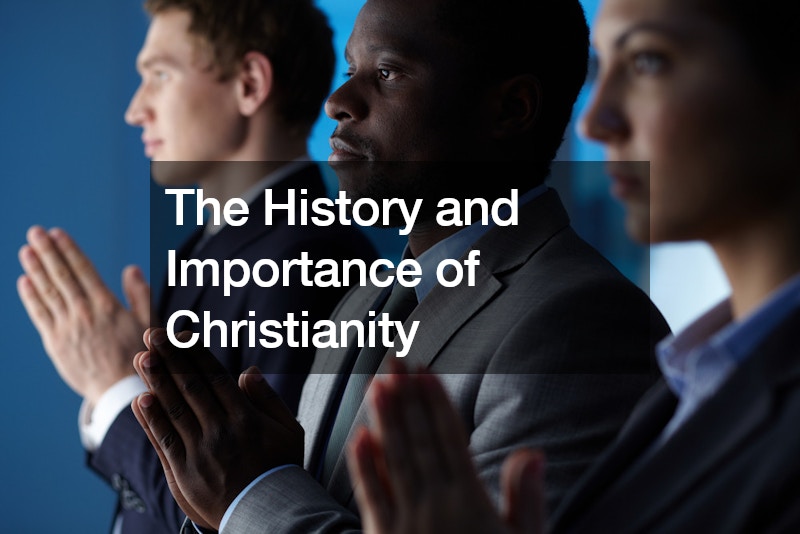
The History and Importance of Christianity

Christianity stands as one of the most significant religious and cultural forces in human history. Its origins trace back to the life and teachings of Jesus Christ, whose message of love, redemption, and salvation has reverberated throughout the ages. Understanding the history and importance of Christianity provides insights into its evolution and enduring impact on societies worldwide.
The Origins of Christianity
Christianity emerged from the teachings of Jesus Christ and his apostles in the first century CE. Initially a small movement within Judaism, it spread rapidly, attracting followers from diverse backgrounds.
Early Development and Organization
The early Christian Church evolved through gatherings in homes and graveyards, where believers worshipped and shared their faith. Organizational structures began to form through councils and debates, culminating in the Council of Nicaea in 325 CE.
The Spread of Christianity
Church services played a pivotal role in disseminating Christian teachings and fostering community among believers. Missionary efforts expanded Christianity’s reach, reaching beyond the Roman Empire to diverse regions.
Theological Debates and Doctrinal Disputes
Christianity faced doctrinal challenges and theological controversies throughout its history. Influential theologians like Saint Augustine and Saint Jerome contributed to the resolution of these disputes, shaping Christian doctrine.
The Patronage of Emperor Constantine
Emperor Constantine’s conversion to Christianity in the 4th century CE marked a significant turning point. His proclamation of religious tolerance and support for the church elevated Christianity’s status within the Roman Empire.
The Role of the Christian Church in Medieval Society
During the Middle Ages, the Christian Church wielded considerable influence, serving as a source of authority, education, and charity. Monasteries and cathedrals became centers of learning and culture.
The Protestant Reformation
The Protestant Reformation in the 16th century challenged the authority of the Catholic Church and led to the emergence of various Protestant movements. It sparked religious and political upheaval across Europe.
Christianity in the Modern World
Today, Christianity remains the world’s largest religion, with billions of adherents worldwide. Its teachings continue to inspire individuals, shape societies, and foster dialogue across cultural boundaries.
The Spread of Christianity and Cultural Influence
As Christianity spread, it encountered diverse cultures and societies, adapting and integrating elements from different traditions. Missionary efforts brought Christianity to regions as far-flung as Africa, Asia, and the Americas, where it interacted with indigenous belief systems, leading to syncretism and the emergence of unique cultural expressions of the faith.
In Europe, Christianity became deeply entwined with political power, shaping the continent’s history and identity. Monarchs and rulers sought the blessing of the Church, and religious institutions wielded considerable influence over governance and social norms. The Christianization of Europe led to the establishment of vast networks of churches, monasteries, and educational institutions that preserved knowledge and promoted literacy.
The Role of Church Services in Worship and Community Building
Central to the Christian experience are church services, where believers gather for prayer, worship, and fellowship. These services provide a sacred space for communal worship, offering solace, guidance, and spiritual nourishment to participants. Through rituals such as the Eucharist, baptism, and liturgical prayers, Christians express their faith and affirm their connection to God and one another.
Church services also serve as forums for teaching and learning, where clergy deliver sermons and impart religious instruction to congregants. This educational aspect of worship helps to deepen believers’ understanding of Christian doctrine and moral principles, fostering spiritual growth and moral development.
Christianity and Social Justice
Throughout history, Christianity has been a driving force for social justice and reform. Inspired by the teachings of Jesus Christ, believers have advocated for the rights of the marginalized, the oppressed, and the downtrodden. From abolitionists fighting against slavery to civil rights activists marching for racial equality, Christians have been at the forefront of movements for social change.
Churches and religious organizations continue to play a vital role in addressing contemporary social issues, including poverty, inequality, and environmental degradation. Through outreach programs, charitable initiatives, and advocacy efforts, Christians strive to fulfill the biblical mandate to love their neighbors and work for the common good.
Christianity in the Digital Age
In the modern era, technology has transformed the way Christians practice their faith and engage with their communities. Online platforms and digital media provide new avenues for worship, religious instruction, and community building. Virtual church services, livestreamed sermons, and social media networks enable believers to connect with fellow Christians across geographical boundaries, fostering a sense of global solidarity and shared purpose.
Conclusion: The Enduring Legacy of Christianity
The history and importance of Christianity underscore its enduring legacy and ongoing relevance in the modern world. Its impact on culture, society, and individual lives continues to resonate, making it one of the most influential forces in human history.
.




